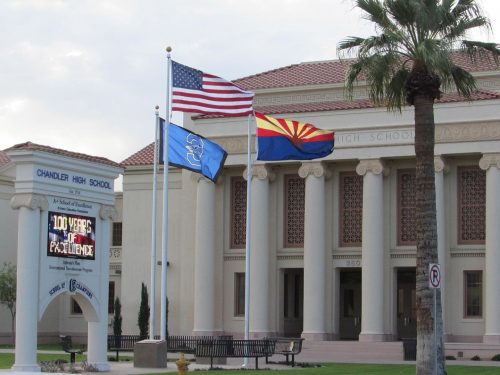By Gloria Gomez/UA Don Bolles Fellow/AZ Mirror
PHOENIX — Bipartisan proposals to fend off the threat of nearly $1.2 billion in mid-year funding cuts for Arizona schools were introduced Monday in the state Senate and House of Representatives, just two weeks ahead of the March 1 deadline to act before schools are forced to layoff staff and face shutting down.
House Speaker Russell Bowers and Senate President Karen Fann, both Republicans, were joined by Democratic leaders Rep. Reginald Bolding and Sen. Rebecca Rios to propose raising a constitutional school spending cap. Democrats earlier this year introduced legislation to do the same, but it never was considered.
The spending cap is known in school funding parlance as the aggregate expenditure limit, or AEL. It was added to the Arizona Constitution in 1980, and it places a cap on how much public school districts can spend each year. The limit is adjusted each year to account for inflation and student enrollment. But a drop in public school enrollment because of the pandemic, coupled with the legislature failing to exempt education funding from a sales-tax extension, puts schools over that limit.
Effectively, that means that schools are unable to spend more than $1.15 billion in money that GOP lawmakers and Gov. Doug Ducey gave them last year.
The constitution does provide a way around the cap: A two-thirds supermajority of each legislative chamber can increase the spending limit. And with Republican leadership backing the new proposals, it’s likely they will be successful. Until now, conservative legislators have been unwilling to join earlier Democratic efforts, in part due to a lawsuit challenging school spending that voters authorized in 2020’s Proposition 208, which would add a 3.50% tax on incomes above $250,000 to help fund teacher salaries.
Several Republican legislators were plaintiffs in a lawsuit challenging whether levying a tax was constitutional. The Arizona Supreme Court punted on the core question, but ruled that the spending would be subject to the AEL — and noted that it would almost certainly exceed the cap. A trial court judge is currently considering whether it does, and if that means Prop. 208 is unconstitutional.
Greenway High School English teacher Amber Gould is one educator who would be immediately affected by funding cuts if the legislature fails to increase the spending cap. Her district, Glendale Union High School District, stands to lose more than $22 million.
“There are some district’s that are going to have to cut major positions, some districts are going to literally have to shut down schools,” she said.
Not only would closing schools and cutting staff let teachers down, Gould said, but families who have only just regained their footing as pandemic-era restrictions are wound down would need to figure out alternative childcare again.
Retired school counselor Anna Cicero said that the stress of the approaching deadline is already affecting principals and teachers. Job security concerns distract teachers from their students, and principals have switched their focus from supporting staff to figuring out how to mitigate the lack of funds.
“Waive the cap and allow teachers to teach and allow principals to do their jobs instead of worrying how to shuffle their staff,” she said.
Gloria Gomez, a senior at the University of Arizona, is the 2022 UA School of Journalism’s Don Bolles Fellow working with editors from the Arizona Mirror. Gomez has interned at the Arizona Daily Star and worked at the Arizona Daily Wildcat. She is a dual major in journalism and political science, with a Spanish minor. She’s a member of the Investigative Reporters and Editors and National Association of Hispanic Journalists. The UA School of Journalism started the fellowship in 1977 to honor Don Bolles, an Arizona Republic reporter killed in a 1976 car bombing.

